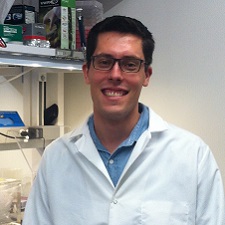Benjamin M. Stinson, PhD
Benjamin M. Stinson, PhD

Our DNA is constantly subjected to damage, and our cells must repair this damage to ensure survival. Breaks in DNA that completely sever DNA molecules are particularly toxic, and failure to repair these breaks can lead to genetic alterations that drive cancer initiation and progression. Dr. Stinson studies the two main cellular pathways that repair these DNA breaks: non-homologous end joining (NHEJ) and homologous recombination (HR). Defects in these pathways are linked to predisposition to many cancers, including leukemia, breast, ovarian, and prostate cancers. His prior work has demonstrated how NHEJ minimizes genetic alterations during DNA break repair. Ongoing work will elucidate fundamental mechanisms of HR that suppress cancer and seek to identify new HR factors. This work has important clinical implications for identifying patients that may benefit from treatments that target HR-defective tumors and for discovering potential mechanisms of resistance to treatment.
